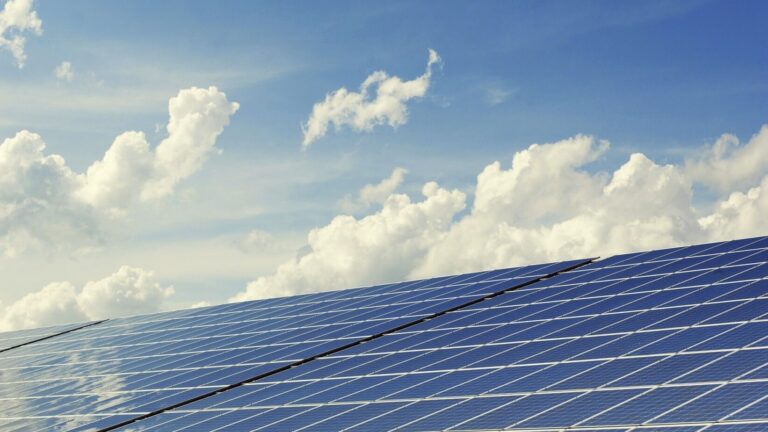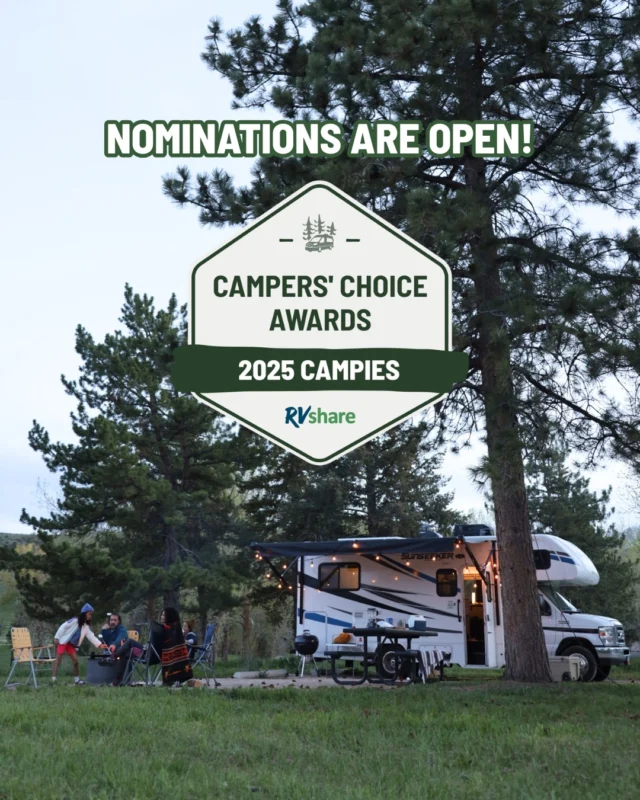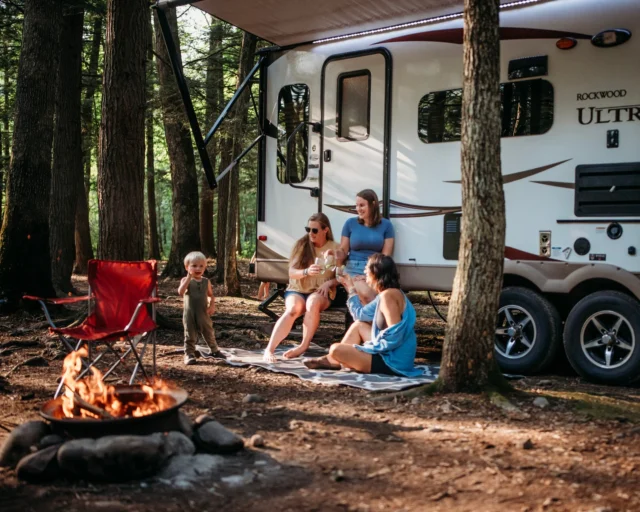
Boondocking is an incredible experience. It gives you the opportunity to escape into the middle of nowhere and enjoy all the peace and beauty offered by nature, while still taking full advantage of the comforts offered by your RV. The only real problem with boondocking the lack of electrical hookups, requiring you to go out of your way to practice RV boondocking power savings.
In this article we will give you tips for conserving energy, discuss the best power source for camping without hookups, and help you create an ideal boondocking battery setup.
This post contains affiliate links. RVshare may receive compensation if you make a purchase after clicking on a product link.
Tips for RV Boondocking Power Savings
The tips below should help you conserve power, stretching it for quite a while, especially if you put all of them to use simultaneously.
Replace Your Light Bulbs
Our first and biggest tip is to replace all of the lights in your RV with LED fixtures. Why? Because LED lights require much less electricity than traditional RV lights.
On top of that, they don’t get hot. This is helpful when camping in the summer, as it means your RV won’t heat up just because you have the lights on. Of course, cooler lights are also better for safety reasons, making this particular upgrade a no-brainer.
Hang New Lights
In addition to replacing your light fixtures with LED lights, you could also choose to hang battery-operated lights in places where you use lights most often. Choose these battery-operated lights over the regular RV lights anytime you aren’t hooked up to power, making sure to keep replacement batteries close at hand.
This will allow you to light your house without using any of the power stored in your “house” battery bank.
Skip the Furnace
While most RV furnaces run on propane, the fans that blow the air out of the vents are run by electricity. This means that running your furnace, even just for a few hours, could wipe out your entire power supply.
For this reason, you will want to run your furnace very sparingly, if at all in order to conserve power. If you need to get warm, try layering your clothes, putting on a hat and socks, and using multiple blankets or a cold-weather sleeping bag before turning on the heater.
Invest in a Portable Heater
If it’s going to be so cold that you absolutely must run a heater, consider investing in a portable propane heater rather than using the RV furnace. These little heaters are quite powerful and can be safely used in an RV as long as you have a window cracked nearby (do not forget this step!).
They run off of small bottles of propane, meaning they won’t be dipping into your RV propane supply and don’t require any electricity at all.
Use Battery-Operated Fans
Let’s say it’s hot out, rather than cold. If this is the case, you’re going to want some way to keep cool and keep the air moving. Since the A/C isn’t an option for most boondocking campers (considering the electricity required to run one), you might have to get creative.
We highly recommend parking in the shade when boondocking during the hot months. We also recommend drinking plenty of water, keeping all windows and vents open in order to catch a cross breeze, and most importantly, investing in battery-operated fans.
Place these fans in the windows on one side of the rig to pull in air from outside and push hot air out the windows on the other side. Consider placing a bowl of ice or a wet washcloth in front of a fan and sitting in front of the breeze to cool off. Just make sure you always keep fresh batteries on hand to keep those fans up and running throughout your trip.
Charge in Your Vehicle
If you’re like the vast majority of people these days, you have a smartphone, tablet, laptop, or some combination of these things that will need charging during your camping trip.
In some RVs, it won’t even be possible to charge these things via the outlets while boondocking. However, even if it is possible, we recommend skipping the RV outlets and heading instead to the car or truck. You can charge all of your devices in your vehicle without using any of your store RV power at all, and assuming it and your alternator are at full health, your vehicle battery will charge right back to full as soon as you drive it.
Put Away Electric Appliances
That coffee maker you like to use every morning? The amazing RV washer and dryer combo that cleans your clothes so well? The electric skillet that works so well for grilled cheese? Skip all of these things while boondocking in order to conserve power.
Instead, use the stove to make your sandwiches, and brew your coffee on a burner using a percolator. Clothes can be kept until you either hit a laundromat or wash them by hand and hang to dry.
Think of all the electric appliances you use every day and find ways to skip those pieces of equipment, either using something in their stead or putting those tasks off until you’re home with plenty of electricity within easy reach.
Pull Out an Ice Chest
Finally, there is the fridge. While most RV refrigerators can be run off of propane, they do require a small amount of electricity to stay up and running, even in this mode. For this reason, if you need to really conserve power, you might want to purchase a high-quality ice chest to use in place of your fridge during dry camping trips.
The Best Power Source for Camping
Even if you use all of the RV boondocking power savings tips listed, you’re bound to need to top up your battery bank at some point during your trip. You have two good options when looking for a power source for camping in the wilderness: solar power and/or a generator.
Solar Power
Collecting solar power allows you to charge your batteries constantly by putting out solar panels and harnessing the power of the sun. This is fantastic as it is noiseless and doesn’t require you to purchase fuel of any kind. That said, getting a full solar setup together can be incredibly expensive.
If you’re interested in trying solar power out during your camping trips, you might want to invest in something like this power briefcase which holds a fold out solar panel. It’s easy to store in an RV and the cost is minimal, giving you the ability to try collecting solar power without investing in a full solar setup.
Generator
The generator option is slightly less expensive to begin with, generally more reliable, and some people even have it built into their RVs. That said, these appliances are noisy, plus they guzzle gas, making them expensive to use. Still, if you’re only using it to top up your batteries once in a while, it isn’t too big of a deal.
A portable 2,000-watt generator such as this one will get the job done quite nicely. However, those who wish to run the A/C with their generator might want to look into something like this 3,500-watt option from Harbor Freight. Either way, you’ll have full batteries in exchange for some noise and some fuel.
…or Use Both
Of course, if you prefer solar power but can’t afford to use it exclusively, there is always the option of trickle-charging as much as you can using portable solar panels and topping off with the generator. This is a good middle ground that tends to satisfy many RVers.
Creating Your Boondocking Battery Setup
Of course, capturing all the energy in the world won’t do you any good unless you have a way to store it. This is where your RV battery bank comes into play.
Most RVs come equipped with a single house battery. This is fine if you only plan on boondocking for a day or so, but isn’t sufficient for a full trip. For this reason, we highly recommend expanding upon that single battery and creating a whole bank of power.
How many batteries you’re able to add to your bank will depend on the amount of storage space you have available and your cargo carrying capacity, but generally speaking, the more you can fit and afford (both weight- and money-wise), the better off you’re going to be.
The Best Battery for Boondocking
You may be wondering what kind of batteries you should be using to create this battery bank of yours. What are the best RV batteries for boondocking?
The truth of the matter is, any RV battery you buy will likely be fine. That said, the lithium-ion RV battery is the cream of the crop and is sure to give you everything you want from an RV battery. These batteries are small, lightweight, and charge very quickly. They are also maintenance-free, something many people don’t realize traditional RV batteries are not.
Unfortunately, lithium-ion RV batteries are also incredibly expensive, leading many people to look for something a little easier on the wallet. Fortunately, there are other options.
Using Your Battery Power
Once you have electricity stored in your batteries, you will need to change that DC power to AC power. AC power is what appliances and outlets need in order to function, meaning the electricity in those batteries is pretty useless without some way to create AC power from it. Fortunately, we have inverters for this purpose.
Make sure you invest in a good quality inverter when building your battery bank. This will allow you to make use of the power you collect and store, so you can be comfy and cozy even in the middle of the wilderness.
Where to Stay
Wondering where you can boondock and put your RV boondocking power savings skills to use? You can find nearly 3000 sites with Boondockers Welcome. Members can search through more than 2888+ total locations across the country, with 70% of hosts also offering hookups. After you become a member there is no cost to stay; thank your host by leaving them an excellent review and spreading the love to other RVers. Be sure to use code BWRVSHARE to save 10% off your membership!
Check out these options as well. Just be aware that some government-owned (BLM) lands will require you to pick up a camping pass. Additionally, many boondocking locations have a stay limit.
- Bureau of Land Management
- National Forests and National Grasslands
- Fish and Wildlife Services
- Public Lands App
- UltimateCampgrounds
- Campendium
- FreeCampsites.net
Ready to try your hand at boondocking? Use these RV boondocking power savings tips and make sure you know how to conserve water while dry camping, and you will be ready for the wilderness camping adventure of a lifetime!






